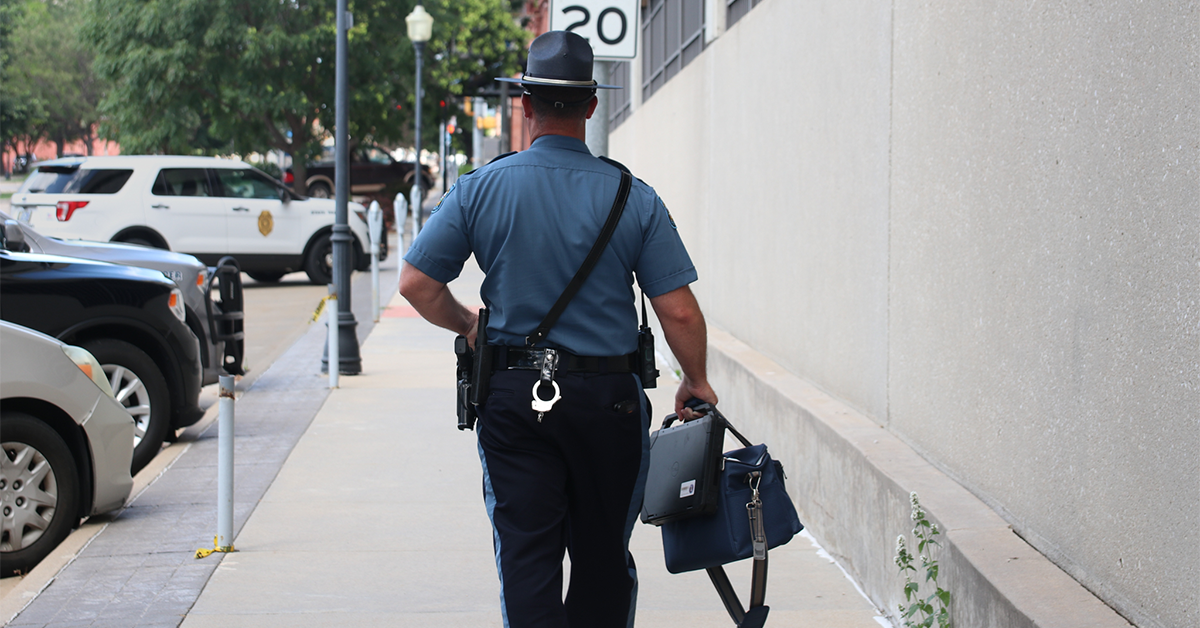Rick Johnson Requests Prison Delay Due to Health Concerns

Rick Johnson, the former Speaker of the Michigan House, has requested a delay in beginning his prison sentence due to recent heart surgery. Johnson, known for his significant role in the most extensive public corruption case in Michigan over the last three decades, was scheduled to report to a federal prison in Duluth, Minnesota by October 24th.
The 70-year-old ex-Republican representative from LeRoy was convicted for accepting bribes exceeding $110,000 in connection with manipulating the Michigan marijuana industry. This situation was further complicated by personal indiscretions, which highlighted the extent of his misuse of power.
Nicholas Dondzila, Johnson's attorney, filed an appeal to U.S. District Judge Jane Beckering to postpone the commencement of Johnson's 55-month sentence to around December 2nd. This delay would allow Johnson, who recently underwent coronary artery bypass graft surgery, adequate recovery time. "The extended start date ensures Mr. Johnson's health is closely monitored and managed post-surgery," Dondzila mentioned in the official court document. Prosecutors have expressed no opposition to this request.
Johnson's role as the chairman of Michigan's medical marijuana licensing board from May 2017 to April 2019 came under scrutiny when it was discovered that he accepted bribes from prominent figures in the marijuana industry. John Dawood Dalaly, an Oakland County entrepreneur, received a 28-month federal prison sentence related to this case. Meanwhile, lobbyists Brian Pierce and Vince Brown are awaiting their sentencing set for October 18th.
The Duluth prison, positioned near Lake Superior's northern coastline and roughly 700 miles from Lansing, has previously housed notable inmates. Among them are ex-New York Mets player Jerry Koosman, imprisoned for tax evasion, and influential businessman Stuart Levine, who played a role in the conviction of ex-Illinois Governor Rod Blagojevich.
Given Johnson's current health status, his physician, Dr. Brandon Wojcik, has vouched for the 90-day postponement, emphasizing the challenges in maintaining his medical regimen in a prison environment. Dondzila also noted the physical constraints Johnson faces, such as limited mobility, which makes travel from Michigan to Minnesota especially daunting.
Michigan Marijuana Businesses Face Penalties for Various Infractions

Michigan's burgeoning marijuana industry experienced regulatory hiccups this September, with numerous dispensaries and other cannabis enterprises facing fines. The reason? A mix of non-compliant sales, packaging discrepancies, and security lapses.
Based on data from the Cannabis Regulatory Agency, it's clear that some of these businesses didn't just have one-off incidents. Multiple fines were issued to a number of companies, pointing to consistent issues in their retail operations.
Tragic Mistaken Identity Leads to Death of Beloved Michigan Musician

In a shocking twist of fate, beloved Michigan musician Egypt Covington lost her life due to a catastrophic marijuana robbery gone wrong. The cannabis community and music enthusiasts alike have been shaken by the revelations from a recent court judgment concerning this tragic case of mistaken identity.
Shandon Ray Groom, 30, and Eugene Moore, 37, both hailing from Ohio, were recently sentenced for their involvement in the ill-fated 2017 attempt to steal cannabis. The marijuana-related crime led to Groom facing a prison term of 17 to 26 years for second-degree murder. Meanwhile, Moore was sentenced to 20 to 55 years, with additional charges for a felony firearm offense.
The Michigan State Police unveiled the grim details of Covington's murder. She was found shot in her Van Buren Township home, a day after attending a yoga class in 2017. Disturbingly, her hands were bound with Christmas lights, a haunting image that has since remained etched in the community's memory.
Court testimonies brought to light a harrowing fact. Shane Lamar Evans, 34, another accomplice, confessed that their initial intent was to rob Covington's neighbor of marijuana. In their quest for cannabis, they mistakenly entered Covington's residence. On encountering her, they impulsively decided to shoot her and subsequently used Christmas lights to bind her. Evans, sentenced earlier, will spend 15 to 25 years behind bars for his role in the crime.
Covington's family, determined to find answers, established 'Justice for Egypt: The Truth Behind the Investigation' on Facebook. Their persistence highlighted the shortcomings of the local township's investigation into this marijuana-linked crime, leading to state police intervention. The case saw significant progress with the arrest of Moore and Evans in November 2020, followed by Groom's in December.
Covington's brother, D'Wayne Turner, memorialized her during the trial, emphasizing her indelible impact on the community. "Egypt was a beacon of light, and we'll always cherish her memory," he stated.
Egypt Covington wasn't just a beacon in the music community but also played a role in the cannabis industry. Working as a beer distributor account manager, she was a familiar face at local cannabis events, bridging the gap between music and marijuana. A local brewery paid homage to her influence in both worlds by launching a special brew named "A Girl Named Egypt."
The tragic loss of Egypt Covington serves as a potent reminder of the risks surrounding the marijuana industry. It underscores the urgent need for stringent safety measures, community awareness, and responsible behavior in the ever-growing cannabis market.
Dodging a Felony with 1,100 Cannabis Plants in Michigan

In a significant ruling by the Michigan Court of Appeals, a man, previously accused of cultivating 1,100 marijuana plants without proper licensing and guarded by dogs, will no longer face felony charges. This decision was influenced by a 2018 voter-approved law that prescribes lighter penalties for such offenses.
Shaaln Kejbou had initially faced charges under the state health code, risking a potential 15-year imprisonment for his large-scale operation in Michigan's Thumb area. However, under the 2018 statute permitting the cultivation and recreational use of marijuana, growing such a quantity would only result in a 90-day misdemeanor.
The appeals court, in a unanimous 3-0 verdict, clarified that Kejbou's case is governed by this newer legislation. While acknowledging the potential perception of injustice by licensed marijuana businesses, the court emphasized that any solution should come from the Legislature. This statement was highlighted in the opinion shared by judges Michelle Rick and Kirsten Frank Kelley.
Supporting this decision, a Tuscola County judge had previously dismissed the felony charges against Kejbou. Commenting on the matter, Michael Kemnitz, Kejbou's lawyer, remarked, "The Court of Appeals simply followed the plain language of the statute that was approved by the electorate."
The 2018 law permits adults aged 21 and above to use marijuana recreationally. Individuals can possess up to 12 plants and also purchase marijuana products from state-authorized outlets.
In a related development, Eric Wanink from the prosecutor's office estimated the value of Kejbou's marijuana stash to be around $3.5 million if sold on the black market. Contesting this, Kemnitz acknowledged the illegality of Kejbou's actions but emphasized its non-felony status. He further added that such operations are risky, noting the destruction of Kejbou's entire crop.
Michigan Residents Face Serious Charges for Interstate Marijuana Transport

Three Michigan residents are now facing serious legal consequences after allegedly attempting to transport multiple pounds of marijuana to New York City. Their story serves as a cautionary reminder to Michiganders about the risks associated with carrying marijuana across state lines.
Kamel Hariri, 30, of Dearborn; Rocco Antonio Melissari, 41, of Inkster; and Donnie Dewayne Hall, 42, of Fenton were apprehended on Interstate 80 in White Deer Township, Pennsylvania. The incident underscores that while marijuana may be legal in Michigan for certain purposes, traveling with it to other states can result in dire legal ramifications.
On October 4th, at approximately 1:10 p.m., their 2022 Ford SUV was pulled over for what appeared to be a window tint violation. However, it wasn't just the window tint that caught the attention of law enforcement; a strong odor of marijuana allegedly emanated from the vehicle.
Upon searching the SUV with the occupants' consent, officers found several pounds of marijuana, packing materials, and a loaded firearm in the center console. The trio confessed that the marijuana was destined for a New York City hotel room, with payment to be received upon delivery.
Charges against the three men include two felony counts each of manufacturing, delivering, and possessing with intent to deliver. They also face misdemeanor charges related to possession of a controlled substance and drug paraphernalia. Hall has an added charge regarding window tint, labeled as "improper sunscreening".
All three are currently held at Union County Jail with a bail set at $50,000 cash. Their legal journey continues with bail hearings and preliminary hearings slated for this month.
This incident provides a stark reminder to Michigan residents: while our state has its own marijuana laws, venturing across borders can place you in jurisdictions with very different, and sometimes harsher, regulations. Always be informed and cautious when considering transporting marijuana, or any controlled substance, interstate.
Michigan Corrections Officer Charged in Drug Smuggling Operation

A Michigan Department of Corrections (MDOC) officer, identified as Kernef D. Jackson, has been slapped with 13 criminal charges over an alleged contraband smuggling operation.
In July 2022, suspicions arose within the MDOC about possible contraband smuggling at the St. Louis Correctional Facility, Gratiot County. Acting on these suspicions, they reached out to the Bay Area Narcotics Enforcement Team (BAYANET) for assistance. "Our team conducted extensive intelligence work, uncovering evidence of attempts to introduce contraband, including marijuana, into the facility. Officer Jackson emerged as a key player in this scheme," stated MDOC spokesperson Kyle Kaminski.
The investigation took a pivotal turn on August 7th this year, when Jackson, 61, was pulled over in Saginaw, his hometown, post a meeting with a yet-to-be-arraigned female codefendant. A search of his vehicle yielded methamphetamine, marijuana, and opioids. Lt. Kimberly Vetter of the Michigan State Police believes that Jackson intended to distribute these drugs among inmates.
Following his arrest, Jackson spent two nights behind bars. He subsequently appeared for arraignment on September 29th before Saginaw County District Judge A.T. Frank. The charges include four counts of felony firearm possession, eight counts pertaining to the trafficking of methamphetamine, cocaine, marijuana, and opioids, and a count of maintaining a drug house, with four of these offenses potentially leading to 20-year prison sentences.
An incarcerated 43-year-old man at the St. Louis prison, serving a term for a second-degree murder conviction from Wayne County, and the aforementioned female civilian, are also implicated as codefendants in this case.
Reacting swiftly to Jackson's arrest, the MDOC suspended him without pay. Jackson has been an MDOC employee since October 2000, Kaminski informed.
Judge Frank set Jackson free on a $100,000 personal recognizance bond, mandating the use of a GPS tether. The case progresses with Jackson's preliminary examination slated for 3:30 p.m., October 18th.


 Helpful Links
Helpful Links